Veni, Vidi and Vici grants awarded to the University of Groningen in 2017
Grants awarded by the Netherlands Organisation for Scientific Research (NWO, Innovational Research Incentives Scheme).
Vici awards
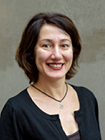
It takes two to communicate: Voice perception and linguistic content
Prof. D. (Deniz) Başkent, Faculty of Medical Sciences
Talking is what makes us human, but hearing impairment can lead to long-term loss of the ability to hear others’ voices. While this is often seen as a disability, in this project we use the effects of hearing impairment to investigate the value of voice perception in speech communication.
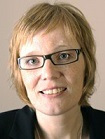
Today’s youth is tomorrow’s workforce
Prof. U. (Ute) Bültmann, Faculty of Medical Sciences
Today, young workers have to deal with changing work and labour markets. Maintaining a healthy working life is important for individuals and society. The researchers will assess mental health and work challenges with life courses lens to support young people transitioning into work and to facilitate a healthy working life.
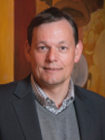
Greener medicines
Prof. G.J. (Gerrit) Poelarends, Faculty of Science and Engineering
Gamma-aminobutyric acids represent abundantly prescribed drugs, which are broadly applied as anticonvulsants, antidepressants and for the treatment of neuropathic pain. In this VICI project, the researchers will develop novel enzymatic synthesis routes for the greener, more sustainable and more step-economic production of these important pharmaceuticals.
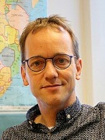
The stopwatch in our brains
Prof. D.H. (Hedderik) van Rijn, Faculty of Behavioural and Social Sciences
Optimal human behavior strongly depends on the accurate estimation of short intervals. Yet, scientists don’t know how the stopwatch in our brain functions. In this project, scientists will construct a computer-model of our brain and explain how we can utilize time for optimal behavior, and how to become better timers.
Veni awards
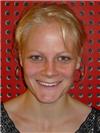
Understanding motor learning to prevent ankle and knee injuries in sports: a novel approach
Dr A. (Anne) Benjaminse, UMCG – Department of Human Movement Sciences
Sports injuries result in a great personal and societal burden. Benjaminse will apply and examine ‘motor learning’, followed by investigating retention and transfer of learned safe movement techniques, aiming to eventually reduce the injury risk on the field.
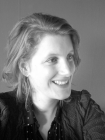
One size fits none: diversity in the symptomatology of patients is the key to targeted depression treatment
Dr L. (Lynn) Boschloo, UMCG – Psychopathology and psychiatry
Depressed patients differ substantially in their response to pharmacological and psychological interventions. Boschloo will use innovative statistical techniques to map individual differences in the precise symptomatology of patients, which will help to better estimate which treatment is most likely to be successful for an individual patient.
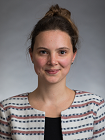
Retirement of the solo self-employed
Dr M. (Marleen) Damman, NIDI
The group of solo self-employed is growing and is becoming increasingly diverse. Which of these solo self-employed individuals are in control over their own retirement? This project examines how work- and career-related diversity within the group of solo selfemployed is related to retirement preparation and retirement experiences.
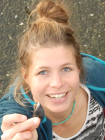
Global change and marine plant diseases
Dr. L.L. (Laura) Govers, RUG – GELIFES
Higher marine plants form the foundation of many coastal ecosystems. These economic and ecological valuable habitats are globally declining, with a yet unclear role of plant diseases. This project will unravel the effect of global change on newly-found Phytophthora infection of seagrasses and its consequences for coastal conservation and restoration.
Did curiosity kill the cat?!
Dr. R. (Ronnie) Hermens, RUG - Philosophy
Schrödinger discovered that, if we take quantum mechanics literally, cats can be alive and dead at the same time. Though a non-literal reading seems preferable, recent research indicates that such a reading is untenable. In this project the precise implications of that research are investigated.
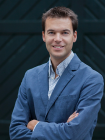
Network Interventions in the Peer Context
Dr. G. (Gijs) Huitsing, RUG –Sociology
How do interventions change social processes among students? Using social network analysis, a behavioral model will be developed that explains how students’ relationships and behavior change during an anti-bullying intervention. Computer simulations on this model generate guidelines for new network interventions that will be further investigated in classrooms for effectiveness.
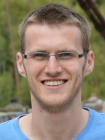
We do not live in a bubble: economic shocks in misspecified panel data models
Dr. A. (Artūras) Juodis, RUG – Economics and Business
Much of economic data at individual and country level is observed over time. To properly describe the co-movements of economic units over time, common shocks and trends have to be accounted for. This project investigates the impact of common shocks in misspecified panel data models.
How do flowers get their colours – and to what end?
Dr. C.J. (Casper) van der Kooi – Faculty of Science and Engineering
This project charts the optics of colourful flowers of plants with very diverse ecologies. Optical and evolutionary analyses will explain how pollinators and plant physiology drove flower colour evolution.
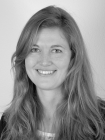
The Communication Model of Cultural Change
Dr. N. (Namkje) Koudenburg, RUG – Social Psychology
This proposal examines the role of micro-level aspects of conversation in macro-level cultural change. A novel CCC-model is developed, proposing that a) the interplay between form and content of social interaction determines the possibility and direction of cultural change, and b) cultural change is mediated by changes in perceived opinion distribution.
Making enzymes to order
Dr. C. (Clemens) Mayer, RUG – Stratingh Institute for Chemistry
Enzymes are the most sophisticated catalysts known to mankind. Harnessing their prowess for industrial applications is an enticing prospect, yet enzymes are seldom optimal for abiological tasks. Mayer will explore new strategies to tailor enzymatic activities inside bacterial hosts and evaluate their potential for creating made-to-order biocatalysts.
Redefining concepts of membrane transport mechanism
Dr. C.P. (Cristina) Paulino, RUG – Groningen Biomolecular Sciences and Biotechnology Institute
Transport across cell membranes is facilitated by proteins that are categorized into channels, primary- and secondary-active transporters, each thought to exert its own distinct mechanism. The KdpFABC complex, however, embodies features of all classes. Investigation of its structure and function will undoubtedly blur the current conceptual boundaries of translocation mechanisms.
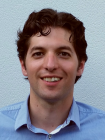
Planning for the unknown
Dr. W. (Ward) Romeijnders, RUG – Economics and Business
Many practical decisions have to be made before key information is known. To support decision making in such situations, researchers will develop new algorithms for the underlying mathematical optimization problems, exploiting recently discovered properties of these problems. The new algorithms will be applied to investment decisions in electricity networks.
More than words: Uncovering the effects of talkers’ voices on real-life speech perception by cochlear implant users
Dr. T.N. (Terrin) Tamati, UMCG – Department of Otorhinolaryngology
Understanding speech in the real world, outside the clinic, can be challenging. This project investigates cochlear implant users’ perception of speech produced by talkers with different voices and accents. Findings will identify difficulties cochlear implant users encounter in their daily lives, to account for them in clinical settings.
Complex genetics of exercise electrocardiography
Dr. N. (Niek) Verweij, UMCG – Cardiology
Exercise can elicit cardiovascular abnormalities and characteristics that are not present at rest. This study will elucidate the genetic mechanisms by which the human body regulates the heart in response to exercise leading up to disease.
Are people egocentric when they talk?
Dr. J. (Jorrig) Vogels, RUG – Center for Language and Cognition Groningen
This research addresses the question whether people take the perspective of the listener into account when they talk. By studying choices in language use ( ‘the girl’ or ‘she’, for example), researchers try to figure out when people speak in an egocentric way and when they do not.
Small pores, big sensors
Dr. C. (Carsten) Wloka-Tjalsma, RUG – Groningen Biomolecular Sciences and Biotechnology
The molecular composition of any cell is rapidly changing and challenging to quantify. In this project, small pores equipped with sensor-proteins will be inserted into cellular membranes to quantify small molecules. The effect of chemotherapeutics on individual cancer cells under consideration of their molecular composition will be evaluated.
Vidi Awards
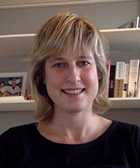
Small changes, big effects
Dr. I.H. (Iris) Jonkers, Faculty of Medical Sciences/UMCG
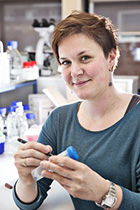
Sugar: a jumpstart for cancer
Dr.ir. M.H. (Maaike) Oosterveer, Faculty of Medical Sciences/UMCG

The individuality of stem cells
Dr. J.T.M.L. (Judith) Paridaen, Faculteit Medische Wetenschappen/UMCG
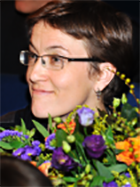
Breast milk as a missing link between mothers and their babies’ health
Dr. A. Zhernakova, Faculty of Medical Sciences/UMCG
The Cosmic Laboratory
Dr. P. D. (Daan) Meerburg, Faculty of Science and Engineering
The conditions in the early Universe present a unique natural event; the ultimate cosmic collider experiment. Signatures from this event provide the opportunity to empirically test the fundamental properties of nature. By identifying observables which optimally utilize big cosmological data, the research aims to find evidence for new physics.
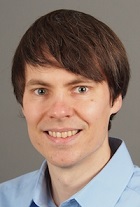
Analysis and Control of Switched Differential Algebraic Equations
Dr. S. (Stephan) Trenn, Faculty of Science and Engineering
Disconnecting power lines leads to large sparks (arc of light) at the circuit breakers. Occurrences of these sparks at the wrong place or at the wrong time can lead to disastrous effects. The novel mathematical modeling framework of switched differential algebraic equations allows to describe, analyze and prevent these sparks.
| Last modified: | 08 January 2024 09.59 a.m. |
